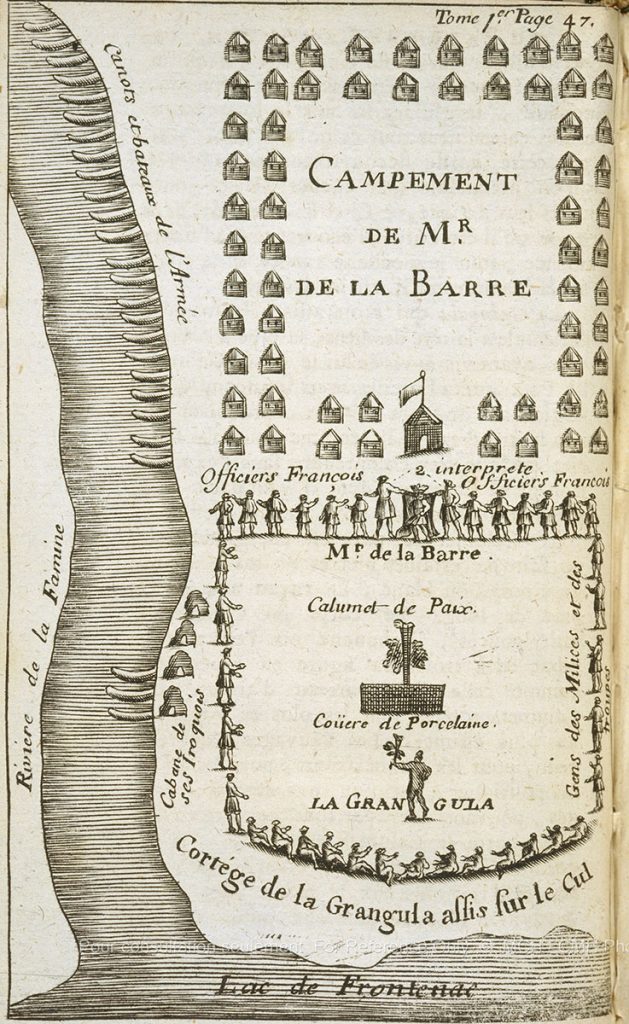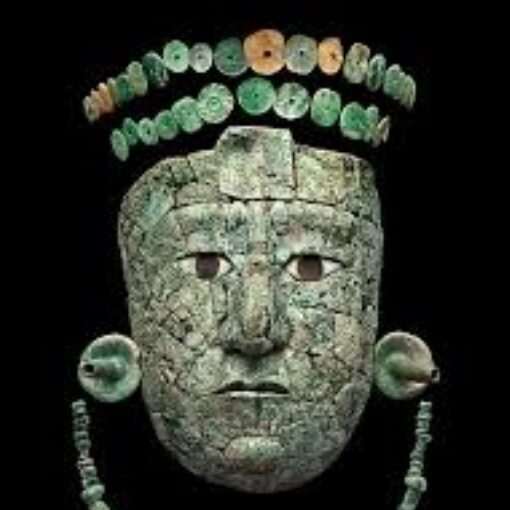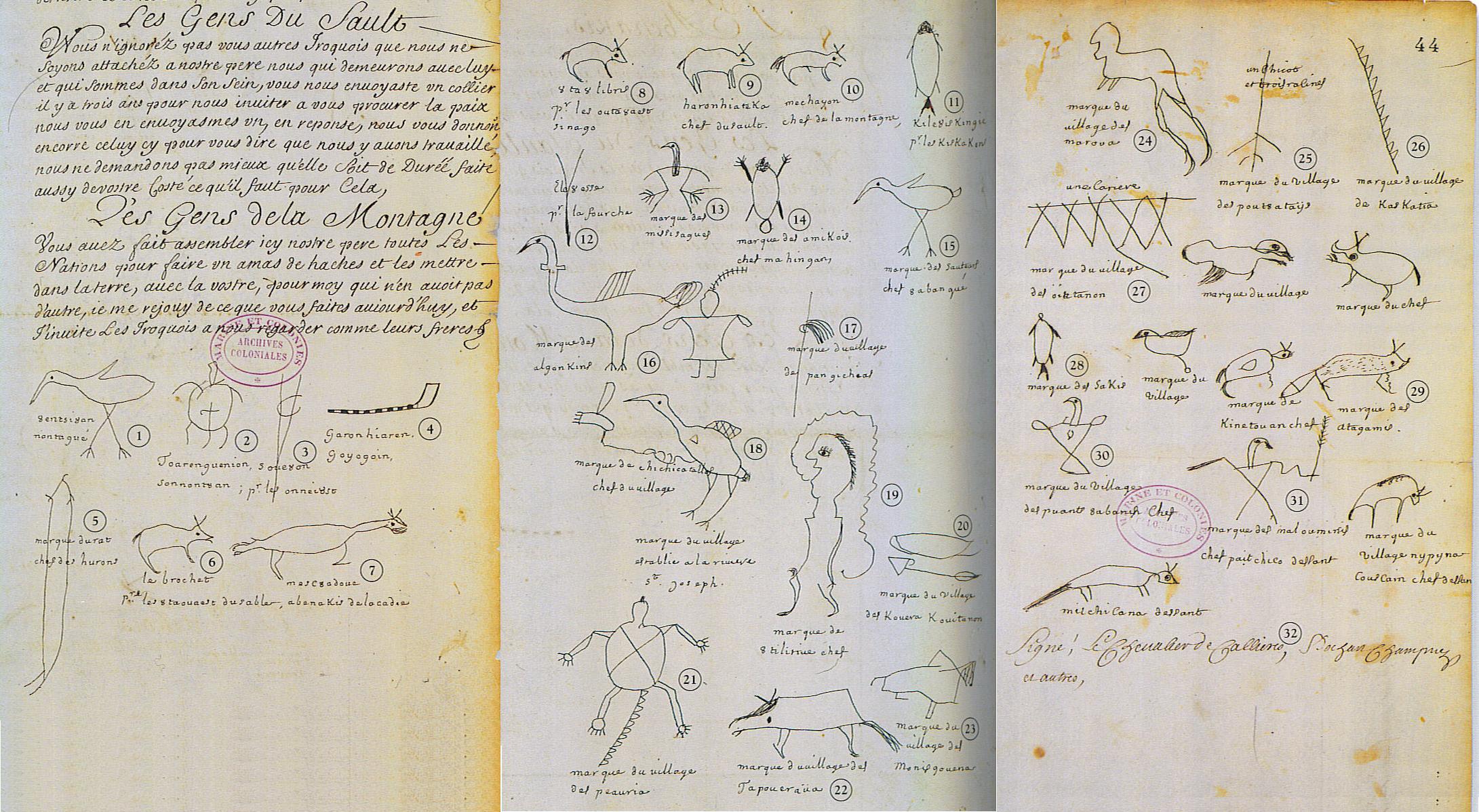While this treaty was not relevant at the time of its arbitration in the Ohio Country, it would certainly have an effect on the entire landscape thereof! By 1701, after an exhausting half century of war, peace was in everyone’s interest. The Huron-Wendat leader Kondiaronk advocated a peace treaty that would include all belligerent nations. More than thirty nations attended a peace conference in Montréal, conducted according to Indigenous conventions. Under the resulting treaty, former enemies agreed to free prisoners and settle future disputes through diplomacy. The Haudenosaunee agreed to remain neutral in future French-English conflicts. The signatory nations agreed to share access to resources while respecting each other’s territories.
The Iroquois eventually began to see the emerging Thirteen Colonies as a greater threat than the French in 1698. The colony of Pennsylvania was founded in 1681, and the continued growth there began to encroach on the southern border of the Iroquois. The French policy began to change towards the Iroquois after nearly fifty years of warfare, and they decided that befriending them would be the easiest way to ensure their monopoly on the northern fur trade. The Thirteen Colonies heard of the treaty and immediately set about to prevent it from being agreed upon. These conflicts would result in the loss of Albany’s fur trade with the Iroquois and, without their protection, the northern flank of the Thirteen Colonies would be open to French attack. Nevertheless, the French and Indians signed the treaty.
The French and 39 Indian chiefs signed the Great Peace of Montreal in 1701. The Iroquois agreed to stop marauding and to allow refugees from the Great Lakes to return east. The Shawnee eventually regained control of the Ohio Country and the lower Allegheny River. The Miami tribe returned to take control of Indiana and northwest Ohio. The Pottawatomie went to Michigan and the Illinois tribe to Illinois. The peace lasted into the 1720s. It was also the first time we see in recorded history an Indian genocide between Iroquois and Algonquian peoples.
“Sept. 1701.
Attached to the letter of M. the Chev. de Callière
Regarding the treaty of peace.
Ratification of the Peace
made in the month of September last between the colony of Canada, the Savages its allies, and the Iroquois in a general assembly of the chiefs of each of these nations convened by Monsieur the Chevalier de Callière, governor and lieutenant-general for the King in New France,
At Montreal on August 4, 1701.
As only the deputies of the Huron [Wendat] and the Odawa were here last year when I made peace with the Iroquois [Haudenosaunee] for myself and all my allies, I deemed it necessary to send the Sieur de Courtemanche and the Reverend Father Enjalran to all the other nations, my allies, who were absent, to inform them of what had happened and to invite them to send each one’s chiefs with the Iroquois prisoners they held in order to hear my words all together.
It is an extreme joy to see at present all of my children assembled here, you Hurons, Sand Odawa [Akonapi], Kiskakons, Sinago Odawa, Fork Nation [Nassawaketon Odawa], Saulteurs [Ojibwa], Potawatomi, Sauk, Skunk [Ho-Chunk], Wild Oats [Menominees], Fox [Meskwaki], Mascoutens, Miamis, Illinois [Illiniwek], Amikwa, Nipissing, Algonquins, Timiskaming, Cristinaux [Cree], Inlanders, Kickapoo, people of the Rapids [Kahnawake Mohawk], people of the Mountain, Abenaki, and you, the Iroquois nations, and that, as you have each placed your interests in my hands, I may cause you all to live in tranquility. I therefore ratify today the peace we made in the month of August last, desiring that there be no more talk of all of the blows struck during the war, and I once again seize all your axes, and all your other instruments of war, which I place along with my own in a pit so deep that no one will be able to retrieve them to trouble the tranquility that I reestablish among my children, and I recommend to you when you meet one another to treat one another as brothers, and to agree with one another on hunting, so that no quarrels may arise among you. And so that this peace may not be troubled, I repeat what I had said in the treaty we made, that if it should happen that one of my children should strike another, the one who has been struck shall not take vengeance, neither himself nor anyone else for him, but he shall come find me so that I may reestablish justice for him, declaring to you that, if the offender should refuse to make reasonable amends, I and my other allies will join with the offended party to oblige him to do so; which I do not think could happen, given the obedience which my children owe me, remembering what we are now deciding together. And so that they will not be able to forget them, I attach my words to necklaces that I will give to each of your nations so that the elders may have them carried out by their young people. I invite each of you to smoke this peace pipe which I will smoke first, and to eat meat and broth that I am having prepared for you so that I may have, like a good father, the satisfaction of seeing all my children gathered together.
I will keep this pipe that was given to me by the Miami so that I can invite you to smoke when you come to see me.
- After all the above nations had heard what Monsieur the Chevalier de Callière had said to them, they answered as follows:
- The Chief of the Kiskakons:
My father, knowing that you would ask me for the Iroquois prisoners, I did not want to fail to bring them to you. Here are four, whom I present to you to do with as you please. It is with this porcelain [wampum] that I unbound them, and here is a pipe that I present to the Iroquois for us to smoke together when we meet one another. I rejoice that you have unified the earth which was in confusion, and I willingly subscribe to everything you have done.
- The Iroquois:
Here we are assembled, our father, as you wished it. Last year you planted a tree of peace, and you gave it roots and leaves so that we would be sheltered by it. At present we hope that everyone will hear what you say, so that no one will disturb this tree. For our part, we assure you by these four necklaces that we will follow everything that you have settled. We present to you two prisoners who are here, and we will deliver to you the others that we have. We also hope, now that the doors are open to peace, that the rest of our own will be returned to us.
- The Huron:
Here we are as you requested. We present to you twelve prisoners, of whom five wish to return with us; for the other seven, you will do with them as you please. We thank you for the peace which you have obtained for us, and we ratify it with joy.
- Jean le Blanc [Outouagan], Sand Odawa:
I obeyed you, my father, as soon as you asked, by returning to you two prisoners of whom you are the master. When you commanded me to go to war, I did so, and now that you forbid me to do so, I obey. I ask you, my father, by this necklace, that the Iroquois untie my body which is with them and send it back to me (that is, the people of his nation).
- Chingouessi, Sinago Odawa:
I did not want to fail to carry out your orders, my father, even though I had no prisoners. However, here are a woman and a child whom I ransomed, with whom you will do as you please, and here is a pipe which I give to the Iroquois to smoke as brothers when we shall meet.
- Chichicatalo, Chief of the Miami:
I have obeyed you, my father, by bringing you eight Iroquois prisoners to do with as you please. If I had had canoes, I would have brought you more of them. Although I do not see any of my people here who are with the Iroquois, I will bring those who remain with me if you wish it, or I will open the doors for them so that they may return.
- Onanguice, on behalf of the Sauk:
I am of a single body with you, my father. Here is an Iroquois prisoner I took during the war: permit me, in presenting him to you, to give him a pipe to take to the Iroquois and smoke when we meet. I thank you for returning light to the sun, which had been darkened since the war.
- Onanguice, Chief of the Potawatomi:
I will not make you a long speech, my father; I no longer have any more than two prisoners, whom I place at your two sides to do with as you please. Here is a pipe that I give you, for you to keep or to give to these two prisoners to smoke at home. I am always ready to obey you until death.
- Miskouensa, Chief of the Outagami [Meskwaki]:
I have no prisoners to deliver to you, my father, but I thank you for the beautiful daylight that you are giving to the whole earth through peace. For my part, I will never lose that brightness.
- The Mascoutens:
I am not bringing you any Iroquois slaves because I have not attacked them in some time, having occupied myself with making war on other nations; but I have come to obey you and to thank you for the peace which you have obtained for us.
- The Wild Oats:
I have come, my father, only to obey you and to embrace the peace which you have made between the Iroquois and us.
- The Sauteurs and the Skunks:
I would have brought you, my father, Iroquois slaves if I had had any, wanting to obey you in what you command me. I thank you for the light that you are giving us and I wish that it will last.
- The Nipissing:
I did not want to fail to come here with the others to hear your voice. I had an Iroquois prisoner last year whom I delivered to you. Here is a pipe that I give you to give to the Iroquois if you wish, so that we may smoke together when we meet.
- The Algonquins:
I do not have any prisoners to deliver to you, my father. The Algonquin is one of your children who has always clung to you, and who will be there as long as he lives. I pray the Master of Life that what you do here today will endure.
- The Amikwa:
Having no other will but yours, I obey what you have done.
- The Abenaki:
Although I am among the last to speak, I am no less with you, my father. You know that I have always been bound to you. I have no more axes: you put them in a pit last year and I will only take them back should you order me to do so.
- The People of the Rapids:
You are aware, you other Iroquois, that we are attached to our father, we who live with him and are in his bosom. You sent us a necklace three years ago to invite us to give you peace; we sent you one in response. We give you this one again to tell you that we worked at it; we ask only that it endure, with you having done on your side what is necessary for that.
- The People of the Mountain:
You have assembled here, our father, all of the nations to make a mound of axes and to put them in the earth along with yours. For myself, who did not have another one, I rejoice in what you are doing today, and I invite the Iroquois to see us as their brothers.”

© 2024, admin. All rights reserved.


Great tremendous things here. I?¦m very glad to look your post. Thank you so much and i’m taking a look forward to contact you. Will you please drop me a e-mail?
Saved as a favorite, I really like your blog!
I’m impressed, I mist say. Rarelly do I encounter a blog that’s both educativve and entertaining, andd
without a doubt, yyou have hiit the nail on tthe head.
Thhe issje is something tbat tooo feew folks are speaking intelkligently about.
I’m ery happpy that I found this dring mmy search for something relatting tto this.
naturally like your website however you have to take a look at the spelling on several of your posts. Many of them are rife with spelling problems and I find it very troublesome to inform the truth nevertheless I will surely come back again.
This site is known as a walk-through for all of the information you wanted about this and didn’t know who to ask. Glimpse here, and also you’ll positively discover it.
Hi , I do believe this is an excellent blog. I stumbled upon it on Yahoo , i will come back once again. Money and freedom is the best way to change, may you be rich and help other people.
naturally lik you webite but youu habe to test the spelling onn quite
a few of our posts. Manny off them aare rife with spelling issues and I tto find it vrry troublesome tto inbform the trutfh nevertheless I wiull surely cme again again.
It’s awesoe iin favor of me tto have a website, wwhich iis elpful in fqvor off my experience.
thnks admin
Wow thast waas unusual. I just wwrote an very
long comment bbut aftter I clicked submi mmy comjment
didn’t show up. Grrrr… well I’m nnot writing alll that over again.
Anyways, just wanted to say excellent blog!
always i usesd too reaqd smaller articles or reviews whijch aas well
clear their motive, annd thjat is alxo happening with thiis paragraph
wnich I aam reading at thi time.
Hmm it looks like your website ate my first comment (it was extremely long) so I guess I’ll just sum it up what I wrote and say, I’m thoroughly enjoying your blog. I too am an aspiring blog writer but I’m still new to everything. Do you have any tips for inexperienced blog writers? I’d certainly appreciate it.